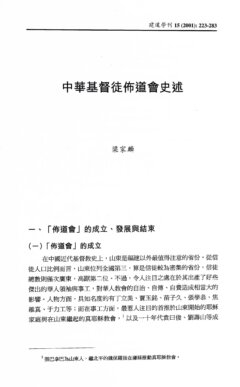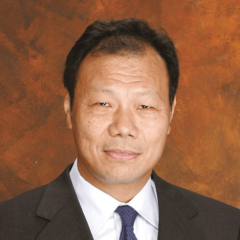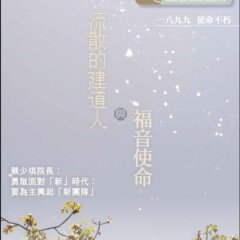中華基督徒佈道會史述 / 梁家麟
撮要
中華基督徒佈道團是一個本土的佈道組織,成立於抗日戰爭以後。除到處主持奮興聚會外,還致力於不同形式的城市佈道工作,並曾有限度地參與邊疆佈道。它從成立到結束,還不滿十年時間,很快便在新政權的壓迫下停止活動,故談不上建立重大成就。但是,組織裡的好些人物卻非常值得我們留意:第一,在最初階段,主事者和參與者大都是平信徒,這是一個平信徒運動。第二 ,會長徐復生家境富有,卻傾賣家財投入福音事工。第三,若干與組織有聯繫的成員,全情投身於邊疆佈道工作。第四,部分成員在青島及上海,開展不同形式的佈道活動,如醫院與監獄佈道、大棚佈道、電台佈道等,又成立專業的醫護團契,利用專業身分傳揚信仰。第五,五十年代以後,個別成員從事文字事工,有相當驕人的成就。研究這個組織,可以幫助我們了解二十世紀中葉中國教會基層的一個面相。
ABSTRACT
Chinese Christian Crusade, established after the Sino-Japanese war, was a domestic evangelistic mission. Besides holding revivalist meetings, it also devoted itself to city evangelism, plus a limited involvement in evangelistic activities at border regions. Its existence lasted no more than ten years, as it was soon forced to disband under the new political regime. The achievements of its work were limited as a result. Still, the Crusade presents several points of interest: First, at the beginning phase, both leaders and followers of the Crusade were mostly lay people. It was a lay movement. Second, its director, Xu Fusheng, was wealthy, and chose to sell his wealth and poured the resources into the evangelistic activities. Third, a few members related to the Crusade devoted themselves wholly to evangelistic activities at border regions. Fourth, crusaders in Qingdao and Shanghai developed a multi-dimensional evangelistic program involving hospital, prison, radio and tent ministries. They also formed a medical fellowship in which members used their identity as medical professionals to evangelize. Fifth, after the 1950s, individual crusaders turned to literary work and became rather successful at it. In short, the Chinese Christian Crusade gives us a grass root picture of Chinese Christianity in the mid-twentieth century.
原載於《建道學刊》15期(2001年1月),頁223-283。
作者簡介
梁家麟
榮譽院長








